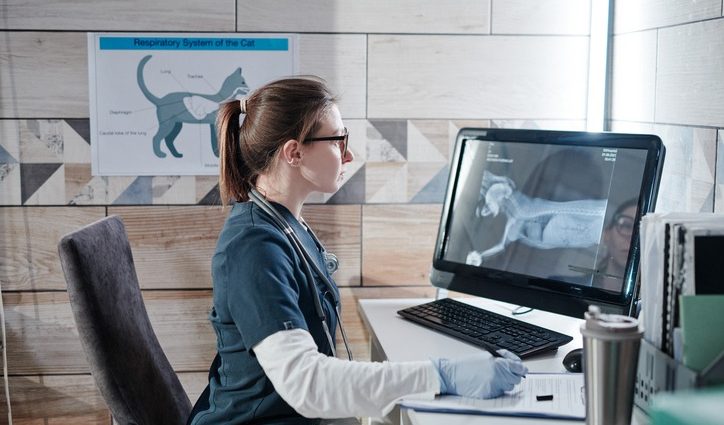When your furry friend isn’t feeling their best, a vet might suggest running some lab work and diagnostic tests to figure out what’s going on. These tests can give a detailed look into your pet’s health and help catch diseases or illnesses early on. Veterinary laboratory and diagnostic tests play a crucial role in assessing the health status of animals, diagnosing illnesses, monitoring treatment responses, and guiding veterinary care decisions.
These tests encompass various procedures and techniques performed on various animal biological samples. Here are some standard components involved in veterinary lab and diagnostic tests:
1. Sample Collection
The first step in veterinary diagnostics is collecting appropriate biological samples from the evaluated animal. Depending on the suspected condition or the type of test being performed in a vet lab, samples may include blood, urine, feces, tissue biopsies, skin or mucous membrane swabs, cerebrospinal fluid (CSF), or other bodily fluids.
2. Sample Processing and Handling
Once collected, samples are processed and handled according to specific protocols to ensure their integrity and suitability for testing. This may involve centrifugation, separation, preservation, or other processing techniques depending on the type of sample and the tests being performed.
3. Laboratory Analysis
Veterinary laboratories utilize various analytical techniques and equipment to analyze biological samples and obtain diagnostic information. Standard laboratory tests include:
-
Hematology: Analysis of blood samples to assess red blood cell count, white blood cell count, platelet count, hemoglobin levels, and other parameters related to blood cell morphology and function.
-
Clinical Chemistry: Measure biochemical markers and metabolites in blood or other bodily fluids to assess organ function, electrolyte balance, glucose levels, liver and kidney function, and other physiological parameters.
-
Microbiology: Culturing and identifying microorganisms (bacteria, viruses, fungi, parasites) from clinical samples to diagnose infectious diseases and determine antibiotic susceptibility.
-
Histopathology: Examining tissue samples (biopsies) under a microscope to assess cellular architecture, identify abnormalities, and diagnose neoplastic (cancerous) or inflammatory conditions.
-
Cytology: Evaluation of cellular samples obtained through fine needle aspirates, swabs, or fluid samples to identify abnormal cell types, assess inflammation, detect cancerous cells, or diagnose infectious agents.
-
Immunology and Serology: Detection of antibodies, antigens, or immune markers in blood or other bodily fluids to diagnose infectious diseases, autoimmune conditions, or allergic reactions.
-
Molecular Diagnostics: Detection and analysis of nucleic acids (DNA or RNA) from clinical samples using polymerase chain reaction (PCR), DNA sequencing, or gene expression profiling to identify genetic mutations, pathogens, or specific biomarkers.
4. Interpretation and Reporting
Once the laboratory tests are completed, the results are interpreted by trained veterinary professionals, such as veterinarians, veterinary technicians, or pathologists. Interpretation involves correlating the test findings with the animal’s clinical signs, history, and other diagnostic information to arrive at a diagnosis or make treatment recommendations. The results are then reported to the referring veterinarian or the animal owner, along with any necessary explanations or recommendations for further evaluation or management.
5. Follow-Up and Monitoring
Depending on the test results and the animal’s condition, follow-up testing and monitoring may be necessary to assess treatment responses, disease progression, or changes in health status over time. Follow-up testing may involve repeating specific diagnostic tests, performing imaging studies (e.g., X-rays, ultrasound), or evaluating clinical parameters to guide ongoing veterinary care and management.
Overall, veterinary laboratory and diagnostic tests are essential in veterinary medicine, providing valuable information to support the diagnosis, treatment, and management of various animal diseases and conditions. On the other hand, if you need urgent care, an emergency animal hospital in Halifax is the place to go. These facilities are equipped to handle all emergencies, from accidents to sudden illnesses.
What to Expect During a Vet Visit
-
History Taking: The vet will ask about your pet’s medical history, diet, and any symptoms they are experiencing.
-
Physical Exam: A thorough nose-to-tail examination to check for any abnormalities.
-
Sample Collection: The vet or a technician might collect blood, urine, or stool samples during your visit.
-
Further Testing: If initial tests suggest a problem, more specialized diagnostics may be recommended.
If you think this is just for cats and dogs, think again. Exotic pets, like reptiles, birds, and small mammals, also need specialized care. And yes, even an amphibian vet knows about your frog’s or salamander’s unique needs. With exotic pets, it’s all about finding an expert vet to provide the best care for your less-common critters.
Preparing Your Pet for Lab Tests
Your pet must follow specific instructions before their appointment to ensure the tests are as accurate as possible. This might mean fasting for several hours or stopping certain medications. Your vet will give you all the details ahead of time.
Ensuring Accurate Results
Accuracy is critical in lab work. Vets depend on precise results to make informed treatment decisions. As a pet owner, you play a part by following prep instructions and reporting symptoms accurately.
Supporting Your Pet Through the Process
Having to run tests can be stressful for both you and your pet. However, understanding what’s involved and preparing accordingly can help ease the anxiety. Your veterinary team is there to support you every step of the way.
Final Thoughts
Ultimately, veterinary lab and diagnostic tests are fundamental to modern pet healthcare. They offer invaluable insights into the well-being of our companions, allowing for timely intervention and effective treatment. Whether it’s a routine check-up or an emergency, these tests ensure our pets receive the care they deserve. By staying informed and involved in the process, you’re playing a vital role in your pet’s health journey.

